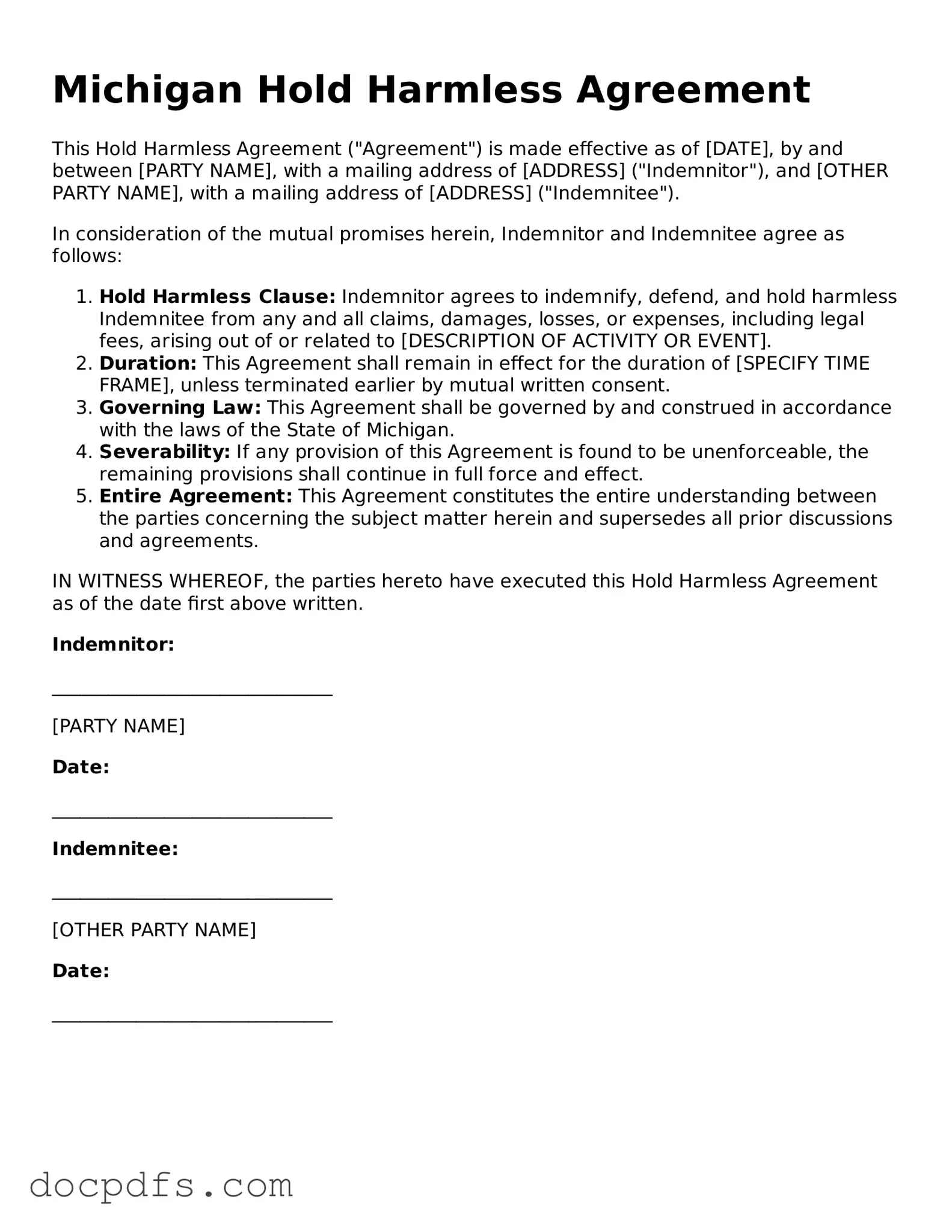What is a Michigan Hold Harmless Agreement?
A Michigan Hold Harmless Agreement is a legal document that protects one party from liability for certain risks associated with an activity or event. By signing this agreement, one party agrees to assume responsibility for any potential damages or injuries that may occur, thereby shielding the other party from legal claims. This type of agreement is commonly used in various contexts, including rental agreements, event planning, and construction projects.
Who typically uses a Hold Harmless Agreement in Michigan?
Hold Harmless Agreements are utilized by a variety of individuals and organizations. Common users include:
-
Property owners and landlords who wish to protect themselves from liability when renting out space.
-
Event organizers who need to minimize their risk when hosting activities.
-
Contractors and subcontractors involved in construction projects.
-
Businesses that provide services and want to limit their liability for potential accidents.
What are the key components of a Hold Harmless Agreement?
While the specific language can vary, a typical Hold Harmless Agreement includes several essential components:
-
Identification of Parties:
Clearly states who is involved in the agreement.
-
Description of Activities:
Outlines the specific activities or events covered by the agreement.
-
Liability Waiver:
Specifies the extent to which one party is protected from liability.
-
Indemnification Clause:
Details how one party agrees to compensate the other for any claims or damages.
-
Governing Law:
Indicates that Michigan law governs the agreement.
Is a Hold Harmless Agreement enforceable in Michigan?
Yes, Hold Harmless Agreements are generally enforceable in Michigan, provided they are drafted properly and do not violate public policy. Courts tend to uphold these agreements as long as they are clear, voluntary, and not overly broad in scope. However, it is important to note that some liabilities, such as gross negligence or willful misconduct, may not be waivable.
How does one create a Hold Harmless Agreement in Michigan?
Creating a Hold Harmless Agreement involves several steps:
-
Draft the Agreement:
Clearly outline the terms, including the parties involved, the activities covered, and the specific liabilities waived.
-
Consult Legal Counsel:
It is advisable to have an attorney review the agreement to ensure it complies with Michigan law and adequately protects your interests.
-
Sign the Agreement:
Both parties should sign and date the document, retaining copies for their records.
Can a Hold Harmless Agreement be revoked?
Yes, a Hold Harmless Agreement can be revoked or modified, but this typically requires mutual consent from both parties. It is advisable to document any changes in writing to avoid misunderstandings. Additionally, if circumstances change significantly, a new agreement may be warranted to reflect the updated situation.
What should I consider before signing a Hold Harmless Agreement?
Before signing a Hold Harmless Agreement, consider the following:
-
Understand the Risks:
Be aware of the specific risks you are assuming by signing the agreement.
-
Consult an Attorney:
Legal advice can help you understand the implications of the agreement and ensure it is fair.
-
Review the Language:
Ensure the terms are clear and that you are comfortable with the liabilities you are waiving.
What happens if a claim is made despite a Hold Harmless Agreement?
If a claim is made despite a Hold Harmless Agreement, the party seeking to enforce the agreement can present it as a defense in court. The enforceability of the agreement will depend on its terms and the circumstances surrounding the claim. If the agreement is deemed valid and applicable, it may protect the party from liability. However, if the claim involves gross negligence or is outside the scope of the agreement, the protection may not apply.

